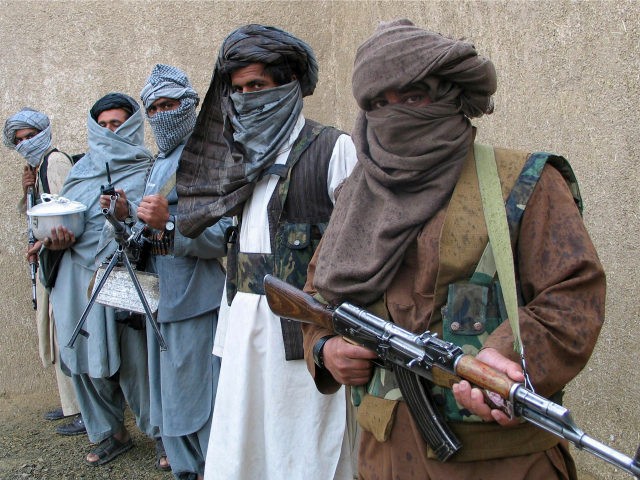The “covert” relationship between Sunni Taliban jihadists in Afghanistan and Shiite state-sponsor of terrorism Iran has endured as a “marriage of convenience” for over a decade, primarily due to their mutual disdain towards the United States, according to various reports.
Various news outlets note that the death of Taliban leader Mullah Akhtar Mohammad Mansour by a U.S. drone strike on May 21 has renewed attention to the relationship between the terrorist group and the Islamic Republic, which according to Foreign Policy is “evolving.”
Citing U.S. intelligence officials, the Wall Street Journal (WSJ) first reported that Mullah Mansour was killed in Pakistan when his car was targeted as he crossed the border from Iran, where he was visiting family.
Hossein Jaberi Ansari, a spokesman for Iran’s foreign ministry, has refuted the version of events in the WSJ report, alleging that the Islamic Republic “welcomes any measure in line with bringing peace and stability to Afghanistan.”
In a recent analysis, Thomas Joscelyn, a senior fellow at the Foundation for Defense of Democracies (FDD) and the senior editor for The Long War Journal (LWJ), notes:
Iran has a long history of backing the Taliban’s insurgency against US and allied forces in Afghanistan. Indeed, the relationship between the two former foes is one of the most misunderstood and oft-overlooked aspects of the 9/11 wars.
Iran and the Taliban nearly went to war in 1998 after senior Taliban commanders slaughtered Iranian diplomats and other Shiites in Mazar-i-Sharif. But by late 2001, as the Americans prepared to topple the Taliban’s government, the situation changed dramatically. Outwardly, the Iranians acted as if they just wanted to help rebuild Afghanistan. Western diplomats have praised Iran for its role in the Dec. 2001 meetings in Bonn, Germany, where a post-Taliban government was established. But there is much more to this story. Just before the American-led invasion of Afghanistan two months earlier, the Iranians cut a secret deal with [long-time Taliban leader and founder] Mullah [Mohammad] Omar’s representatives.
Iran has reportedly provided the Taliban with weapons and other military support to combat U.S.-led coalition troops in Afghanistan.
The ties between Iran and the Taliban have evolved into a mutual effort to prevent the Afghan branch of the Islamic State (ISIS/ISIL), known as the Khorasan Province (IS-KP/ISIL-K), from flourishing in the region. Khorasan is an ancient name for territory to covers areas in Afghanistan, Pakistan, Iran, and other surrounding countries.
Al-Monitor learned from experts that “Iran has played a complicated game with the Afghan militant group for over a decade and has stepped up contacts in recent years in part to keep an even more dangerous organization — the group that calls itself the Islamic State — from expanding its territory to Iran’s east.”
IS-KP is primarily based in the eastern Afghan province of Nangarhar, along the Pakistan border, which lies on the opposite side of the Iran-Afghanistan international boundary.
The group has up to 3,000 supporters in Afghanistan, the Pentagon has estimated.
“My own personal observation from exchanges with Iranians in various settings is that their estimate of the threat of [IS] in Afghanistan is higher than that of the United States,” Barnett Rubin, a former senior adviser to the Barack Obama administration on Afghanistan and Pakistan told Al-Monitor, adding that the Russians share that view.
Iran’s ally Russia is reportedly cooperating with the Taliban to fight ISIS in Afghanistan.
Foreign Policy points out:
News reports over the last year suggest increased levels of Iranian cash and arms transfers to the Taliban. But why? One reason, which may also help explain Moscow’s recent outreach to the Taliban, is the shared unease about the rising influence of the Islamic State in Afghanistan…
Despite the ties between the Taliban and Iran, Rubin noted, “There is more alignment between the Taliban and Pakistan,” which has served as a safe haven for the Taliban and al-Qaeda leaders for many years. “With Iran, it’s a marriage of convenience.”
The link between the Taliban and Iran has been well documented by the U.S. government. After meeting with top U.S. military officials in Afghanistan late last year, Rep. Robert Pittenger (R-NC), chairman of the Congressional Task Force on Terrorism and Unconventional Warfare, told Breitbart News that Iran’s financial and military support for the Taliban continues to be a pressing concern.
Echoing Pittenger, Rep. Ryan Zinke (R-MT), former commander of the fabled Navy SEAL Team Six and member of the House Armed Services Committee, also told Breitbart News that the Iran continues to lend assistance to the Taliban.
In recent years, President Obama’s Pentagon and State Department have acknowledged that a mutual opposition to the U.S. military presence in Afghanistan has brought Iran and the Taliban together despite the historic animosity between the two sides.

COMMENTS
Please let us know if you're having issues with commenting.